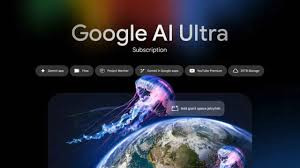Google Launches AI Ultra and AI Pro Subscriptions at I/O 2025, Promises Smarter Tools for All Users

IIE DIGITAL DESK : The annual developer conference, Google I/O 2025, The annual developer conference, Google I/O 2025, the tech giant unveiled two new premium AI subscription services—AI Ultra and AI Pro—as part of its broader push to integrate artificial intelligence more deeply into users' daily experiences. The announcement marks a significant step in Google's ongoing efforts to stay at the forefront of the AI race, offering personalized productivity enhancements for both individual users and professionals.
The new subscription tiers, introduced by CEO Sundar Pichai during the keynote address, are designed to cater to distinct segments of users based on their needs and usage intensity. AI Ultra represents the pinnacle of Google’s AI capabilities, tailored for heavy users such as content creators, developers, researchers, and enterprises. Meanwhile, AI Pro is positioned as a more affordable, entry-level offering for regular users seeking enhanced AI features in tools like Gmail, Docs, Sheets, and more.
Both AI Ultra and AI Pro are powered by Google’s latest Gemini 2.5 AI model, which the company claims delivers smarter, faster, and more context-aware responses across applications. These plans provide advanced writing assistance, code generation, summarization, language translation, image generation, and deeper integration with Google Workspace.
In a move to rival OpenAI’s ChatGPT Plus and Microsoft’s Copilot, Google has clearly drawn a line between free and premium capabilities. While basic AI features will remain available to all users, many of the high-efficiency tools—such as extended context understanding, multimodal reasoning, and advanced creativity functions—will now be paywalled under these new plans.
As for pricing, Google announced that AI Ultra will be priced at $29.99 per month, targeting users who require the highest performance and AI customization. AI Pro, on the other hand, will cost $19.99 per month, providing access to most premium AI tools with slightly reduced computing power and fewer customization options. A seven-day free trial will be offered to new subscribers, allowing them to experience the features before committing.
One of the most impressive demonstrations came when Google showcased AI Ultra's ability to assist in coding projects by suggesting entire function blocks in Python and JavaScript, debugging in real time, and even generating front-end UI elements. For creators, the AI could compose scripts, summarize research documents, and generate social media captions tuned for different platforms, all with minimal input.
Availability-wise, Google stated that both subscription services will roll out gradually, beginning in the United States from June 2025, followed by a phased global release in the coming months. Google also hinted at regional pricing adjustments and the inclusion of AI Pro features within select business plans for Google Workspace users.
To ensure responsible AI usage, Google has reiterated its commitment to transparency and safety. Both AI tiers will include built-in guardrails for factual accuracy, bias detection, and data privacy. Users will have more control over what data is shared with AI models, and Google is offering enterprise-grade security protocols for subscribers using the services in a professional capacity.
The announcement comes at a time when tech giants are racing to monetize AI tools, and Google is positioning itself as not just a provider of intelligent assistants, but as a platform for building, creating, and working smarter. With AI Ultra and AI Pro, the company is betting on a future where artificial intelligence is not just helpful—but essential—in shaping how users learn, work, and communicate.
With this strategic expansion, Google appears ready to challenge the dominance of its AI rivals and cement its role in the rapidly evolving AI subscription ecosystem.
You might also like!

























